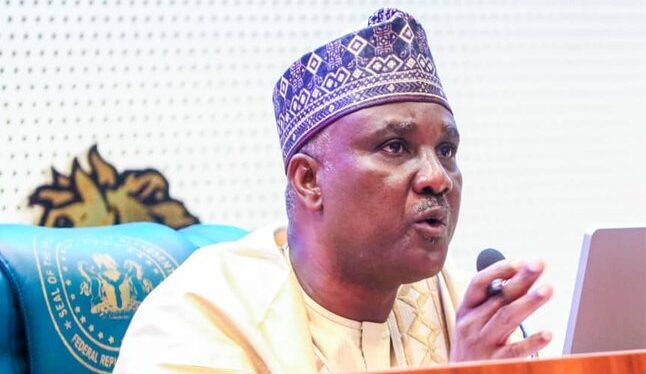The Speaker Federal House of Representatives, Hon Tajudeen Abbas has called on citizens to hold government officials accountable for their actions and also assess them based on their performance.
The Speaker who was who was represented by the Deputy Speaker, Hon Benjamin Kalu stated this at the Conference on National Integration, organized by the Kukah Centre.
Speaking on national cohesion, the Speaker said President Bola Tinubu has prioritized national healing and nation-building since assuming office.
He said embracing diversity is not without challenges, it requires concerted effort, careful planning, and the commitment of every segment of society – especially from those in leadership positions.
The Lawmaker further stated that the burden of fostering national cohesion and effectively managing diversity rests on leaders across all facets of our society -government, religious organizations, traditional institutions, and families.
He said government officials set the legislative and policy frameworks that ensure equality and protect the rights of all citizens, thereby creating a stable environment where diversity is respected and valued.
Hon Abbas also said that religious leaders play a crucial role by promoting moral values and tolerance among their followers, thus mediating conflict, and traditional institutions, with their deep-rooted authority in local communities, are essential in preserving cultural heritage and promoting mutual respect among various ethnic groups.
“Critically, citizens must hold leaders and government officials accountable for their actions and assess them based on their performance and the merits of their arguments rather than sentiments”, he said.
He said that the House of Representatives will ensure strict adherence to constitutional provisions regarding federal character and affirmative action, ensuring equitable representation and resource allocation across all regions and geopolitical zones.
ALSO READ: Fubara commissions new naval training command headquarters in Rivers
The Speaker therefore said that the ongoing constitutional amendment process aims to strengthen these mechanisms, promoting a more inclusive, fair, and just society.
“The House has already received several recommendations on strategies and measures for promoting national cohesion. I invite all stakeholders to share their ideas with us.
“Additionally, our committees have been empowered and mandated to prioritize matters related to national integration. The House, as Nigeria’s most representative body, is dedicated to leveraging the legislative process to promote harmony and cohesion. We aim to strengthen our national ties and bridge existing divides through robust debates, consultations, and collaborations’, he added.
In his remarks, Bishop Mathew Kukah, the founder of Kukah Centre, said building the nation is not about apportioning blame, rather it is about the urgency of national integration.
He said national integration doesn’t necessarily mean everybody must work the same talk the same, be the same, it is for Nigerians to understand the intricacies of managing diversity.
“The Americans have dealt with this problem every country has dealt with this problem. We accept it as a gift of God. But how do you manage it?
“The challenge for us in Nigeria, and maybe parts of Africa is the extent to which our identities have become instruments and weapons of war
“We always talk about Christians or Muslims about Igbos and yorubas about Ijaws and you ask yourself in the final analysis, we all accept that God didn’t make a mistake by bringing us here
“National Cohesion is important because without it, it is impossible for us to grow and this is why even the richest among us in Nigeria is embarrassed about our riches
“This country is increasingly in recession. So the urgency of National Cohesion is a call that we make and we continue to make
“I think everything in Nigeria suggests very clearly very, very clearly that Nigerians have no intention of going anywhere, those who are travelling are not travelling because they are giving up on the country, people are travelling because they want a better life and hopefully they will come back and enrich our country.
“I think that what we have done is to, first of all, awaken our consciousness of the fact that Nigerians need a better life. Nigerians need to nurture their dreams, and of course, people feel excluded. And the challenge of this conversation is to come back to the table.
“This government is working under the principle of a renewed hope, and hope is not a strategy. But hope offers us a scaffolding, which we can handle the ideas. So I think that the most important thing about our conversation is that we need a society in which ordinary citizens can feel a sense of belonging”, he said.
